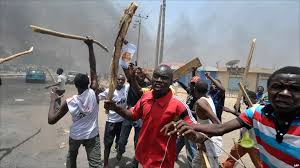
They Killed My Dad in Jos, Now They’re Killing Yours in Benue
By Hafsat Ibrahim
The haunting shadow of bloodshed in Nigeria is growing darker with each passing day. What began as sporadic attacks has turned into a recurring nightmare for too many communities. These killings must stop—because one life lost can echo through generations.
Nigeria cannot continue to pretend to be fighting insecurity while unaddressed massacres sweep across its heartland. True peace is not a slogan. It is a duty. And the government owes its citizens safety, justice, and the dignity of life. Brotherhood and healing must be our shared pursuit, but only if our leaders act and our institutions serve.
Just a few months ago, Plateau State—once known for its serenity and scenic beauty—was plunged into horror. Over 40 innocent lives were slaughtered, many of them women and children, in what many have described as an act of ethnic cleansing. The attackers came under the cover of darkness, armed and unchallenged.
The state had barely begun to mourn when Benue was hit. The food basket of the nation is now a blood-soaked graveyard. In the dead of night, heavily armed assailants—allegedly herdsmen—descended on communities, killing indiscriminately. These attacks are coordinated, brutal, and frequent, exposing the alarming failure of our national security architecture.
So I ask: when will this end? When will lives start to matter in Nigeria? When will the government stop offering empty promises and start delivering on its constitutional responsibility to protect? When will justice be served—not in speeches, but in action? When will the silence end?
Most importantly, when will we find the courage to say enough is enough? I ask not just as a citizen, but as someone who has lived this pain. In 2001, the Jos crisis shattered my family. My father—young, healthy, full of dreams—was murdered in cold blood. His only crime? Leaving the house to provide for us, like any responsible man would.
He never came back. I was just two years old. That singular act of violence altered my life forever. I grew up without a father’s love, without his protection or his guidance. My mother, left to raise us alone, bore the burden of two parents. She gave her all—her peace, her joy, her dreams—just to hold us together.
I grew up broken, trying to heal from a wound that never quite closed. Now, 24 years later, I am still writing about the same pain, only this time, it is someone else’s father. Someone else’s brother. Someone else’s child. Nigeria has learnt nothing. And the blood keeps flowing.
This piece is not just a personal lament. It is a call for justice—for every soul lost in Plateau, in Benue, and across the country. Our leaders must reorder their priorities and rebuild this failing security structure. They must give hope to the hopeless, voice to the voiceless, and safety to those simply trying to live.
The bitter truth remains: Nigeria’s security system is broken. From the Boko Haram insurgency in the North-East to banditry in the North-West, farmer-herder clashes in the North-Central, and kidnappings nationwide, our armed forces and police have failed to rise to the occasion. And under the 1999 Constitution, security lies squarely with the Federal Government.
Governors, though branded “Chief Security Officers,” are often powerless in times of crisis. These killings are not just tragic—they are barbaric, inhuman, and a direct threat to Nigeria’s unity and survival. Where justice is denied, peace will always remain a fantasy.
The tears in Plateau are real. The blood in Benue is real. The trauma is real. And so must be our response. Plateau is bleeding. Benue is weeping. Its people are tired. And I write this with a heavy heart and tearful eyes, not just in mourning—but in protest.
Hafsat Ibrahim is a peace advocate and survivor of the 2001 Jos crisis. She writes from Abuja.
